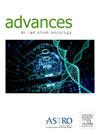Clinical Efficacy of Hydrogen Therapy on Acute Radiation Enteritis and Inflammatory Response in Patients with Cervical Cancer Undergoing Concurrent Chemoradiation Therapy
IF 2.7
Q3 ONCOLOGY
引用次数: 0
Abstract
Purpose
Acute radiation enteritis (ARE) is a common toxic inflammatory reaction in patients with cervical cancer undergoing concurrent chemoradiation therapy (CCRT). Molecular hydrogen, as a novel antioxidant and anti-inflammatory agent, may alleviate treatment-related toxicity. This study aimed to evaluate the efficacy of inhaled hydrogen in preventing ARE and modulating systemic inflammation.
Methods
Eligible patients with cervical cancer undergoing CCRT were prospectively enrolled and randomized into an experimental group (n = 28) or a control group (n = 30). The experimental group received inhalation therapy with a hydrogen-oxygen gas mixture (66.6% hydrogen, 33.3% oxygen; 3 L/min, 2 h/d) on each radiation therapy day. Inflammatory biomarkers—including C-reactive protein, neutrophil-to-lymphocyte ratio, platelet-to-lymphocyte ratio, and interleukin 6—as well as hemogram parameters, fecal occult blood, Late Effects Normal Tissue Task Force—Subjective, Objective, Management, and Analytic scores; Patient-Generated Subjective Global Assessment scores; and Radiation Therapy Oncology Group enteritis grades were monitored during treatment and Response Evaluation Criteria in Solid Tumors scores.
Results
Baseline characteristics (age, tumor stage, pathology, and surgical history) were balanced between groups (P > .05). Compared with the control group, the experimental group showed significantly lower levels of C-reactive protein, neutrophil-to-lymphocyte ratio, interleukin 6, and fecal occult blood positivity rates (P < .05). Clinical assessments also indicated lower Late Effects Normal Tissue Task Force–Subjective, Objective, Management, and Analytic and Patient-Generated Subjective Global Assessment scores and milder Radiation Therapy Oncology Group enteritis grading in the hydrogen group (P < .05). Importantly, no significant difference in tumor response was observed between groups based on the Response Evaluation Criteria in Solid Tumors, suggesting that hydrogen therapy did not interfere with the antitumor efficacy of CCRT. No adverse events related to hydrogen inhalation were reported.
Conclusion
Hydrogen inhalation is a safe and effective adjunctive therapy that significantly alleviates inflammation and mitigates clinical symptoms of ARE in patients with cervical cancer who are undergoing CCRT, without compromising antitumor treatment outcomes.
氢疗法治疗宫颈癌同步放化疗急性放射性肠炎的临床疗效及炎症反应
目的急性放射性肠炎(acute radiation enteritis, ARE)是宫颈癌同步放化疗(CCRT)患者常见的中毒性炎症反应。氢分子作为一种新型抗氧化剂和抗炎剂,可能减轻治疗相关的毒性。本研究旨在评估吸入氢在预防ARE和调节全身炎症中的作用。方法前瞻性选择符合条件的宫颈癌行CCRT患者,随机分为实验组(n = 28)和对照组(n = 30)。实验组患者在每个放疗日采用氢氧混合气体(氢66.6%,氧33.3%,3 L/min, 2 h/d)吸入治疗。炎症生物标志物——包括c反应蛋白、中性粒细胞与淋巴细胞比值、血小板与淋巴细胞比值和白细胞介素6——以及血象参数、粪便隐血、后期效应正常组织任务组——主观、客观、管理和分析评分;患者主观整体评估评分;在治疗期间监测肠炎等级和实体瘤反应评价标准评分。结果两组患者的基线特征(年龄、肿瘤分期、病理、手术史)比较平衡(P > 0.05)。与对照组相比,实验组c反应蛋白水平、中性粒细胞与淋巴细胞比值、白细胞介素6水平和粪便隐血阳性率均显著降低(P < 0.05)。临床评估还显示,氢组的后期效应正常组织任务组主观、客观、管理、分析和患者主观整体评估评分较低,放射治疗肿瘤组肠炎评分较轻(P < 0.05)。重要的是,根据实体瘤反应评价标准,两组间肿瘤反应无显著差异,提示氢疗法不干扰CCRT的抗肿瘤疗效。没有与氢气吸入相关的不良事件报告。结论氢吸入是一种安全有效的辅助治疗方法,可显著减轻宫颈癌行CCRT患者急性急性呼吸道感染的炎症和临床症状,且不影响抗肿瘤治疗效果。
本文章由计算机程序翻译,如有差异,请以英文原文为准。
求助全文
约1分钟内获得全文
求助全文
来源期刊

Advances in Radiation Oncology
Medicine-Radiology, Nuclear Medicine and Imaging
CiteScore
4.60
自引率
4.30%
发文量
208
审稿时长
98 days
期刊介绍:
The purpose of Advances is to provide information for clinicians who use radiation therapy by publishing: Clinical trial reports and reanalyses. Basic science original reports. Manuscripts examining health services research, comparative and cost effectiveness research, and systematic reviews. Case reports documenting unusual problems and solutions. High quality multi and single institutional series, as well as other novel retrospective hypothesis generating series. Timely critical reviews on important topics in radiation oncology, such as side effects. Articles reporting the natural history of disease and patterns of failure, particularly as they relate to treatment volume delineation. Articles on safety and quality in radiation therapy. Essays on clinical experience. Articles on practice transformation in radiation oncology, in particular: Aspects of health policy that may impact the future practice of radiation oncology. How information technology, such as data analytics and systems innovations, will change radiation oncology practice. Articles on imaging as they relate to radiation therapy treatment.
 求助内容:
求助内容: 应助结果提醒方式:
应助结果提醒方式:


